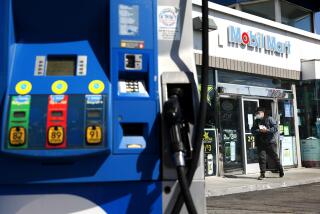Firms Pump Up Fuel Claims, Group Says : Consumers: Misleading ads suggest high-octane fuels improve cars’ performance, and gasoline is often mislabeled, Public Citizen’s analysis charges.
- Share via
WASHINGTON — U.S. oil companies dupe American motorists out of $3 billion annually by falsely suggesting that high-octane fuels improve performance and help maintain engine efficiency in the overwhelming majority of vehicles, a consumer research group charged Wednesday.
Furthermore, the group said, companies frequently mislabel gasoline, indicating higher octane levels than the fuel actually contains.
Only 3% of cars on the road truly need “premium” gasoline, namely Ferrari, Lamborghini, Mercedes and other high-performance automobiles, according to Public Citizen, a consumer research group established by Ralph Nader. Yet high-octane gasoline accounted for more than 20% of fuel sales last year, the group said.
Companies surveyed in a recent analysis, including Amoco, Exxon and Mobil, bombard the public with $200 million worth of advertising annually, much of it misleading, Public Citizen President Joan Claybrook said at a news conference.
Industry officials dismissed the consumer analysis as “ludicrous” and defended their products.
Ronald Jones, vice president of the American Petroleum Institute, a coalition of oil conglomerates, said while there are “no advantages in overbuying” octane fuel, a high-performance car that does not receive premium gas will not operate as well as it could. He estimated that 25% of cars on the road--including those that have traveled more than 15,000 miles--need the higher octane fuel.
Tom Mueller, a spokesman for Amoco Corp., said consumers were responsible for using the proper octane levels as dictated by their car owner manuals.
The octane rating in conventional gasolines indicates a fuel’s ability to resist engine knocking or pinging. Knocking, which occurs when the fuel is ignited too early, can cause a loss of power or damage the engine, explained Public Citizen chief researcher Christopher Dyson. Regular unleaded gasoline has an octane rating of 87. For purposes of the study, high-octane gases were defined as those with ratings above 87.
“Too many consumers believe incorrectly that high-octane gas is better for their cars,” Dyson told reporters. “We would like to correct that misperception.”
A Public Citizen survey of major gasoline companies disclosed that nearly all fuels have the same cleaning effects in all octanes. General Motors Corp. spokesman Greg Terry said virtually all GM cars, like most others, are equipped with knock sensors, which retard the ignition of fuel, adding that “there does come a time, midway through or toward the end of the life of the car, when higher octane gasoline has legitimate engineering and environmental uses.” Federal law requires full disclosure of octane levels along each stage of the gasoline market from refiner to distributor to retailer, said a spokesman for the Federal Trade Commission, the agency responsible for octane rule enforcement.
Although automobile owner’s manuals contain the manufacturer’s recommended octane number, Claybrook charged that the “federal cop,” referring to the FTC, “has been asleep on the regulation beat.” The FTC has prosecuted a total of four octane-related cases against oil companies, one for false advertising and three for mislabeling. None resulted in financial penalties, the spokesman said.
Public Citizen researchers also concluded that only 25 states have octane monitoring programs designed to prevent mislabeling. While California tests octane labels, Texas--the nation’s largest oil state--does not. But the FTC “is not in a position to investigate every gas station,” the FTC spokesman said.
Public Citizen called for stricter monitoring of gasoline advertising by the FTC, and asked the Environmental Protection Agency, the federal agency that performs octane testing, to require that the “unleaded fuel only” label near the tank fill inlet of most cars also show the recommended octane number.
Claybrook showed reporters a letter she had written to FTC Chairwoman Janet D. Steiger, urging the agency to investigate certain oil companies for false or misleading advertising.






